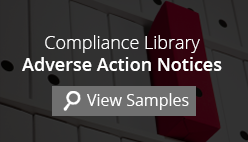
In November 2018, national retailer of pet supplies, Petco, was ordered to pay 1.2 Million dollars in a California Employment Background Screening Class Action Settlement. The case was brought against the company in 2016 when two applicants found that the employer "obtained and reviewed consumer reports" about their financial history without first obtaining consent. One applicant was hired but the other was denied employment due to adverse information on her background check report. She was not notified properly so she could dispute any inaccurate information.
With the number of Fair Credit Reporting Act (FCRA) lawsuits against employers, it's obvious that job applicants are more aware of their applicant rights than ever before. Is your screening provider giving you guidance on FCRA compliance so your organization is protected against litigation for improper adverse action?
Let's look at the case against Petco.
Is Consent is Needed to Obtain a Background Check?
The case against Petco soon became a class action lawsuit and settlement for any job seekers that applied within a particular time period. According to the case, applicants for employment at Petco were not asked for authorization and consent for the company to obtain information through background checks.
What the FCRA says: The FCRA states that employers must provide a "clear and conspicuous" document to the applicant asking for consent to run a background check. The document must be on its own, separate from any other job application or forms, and clearly inform the applicant that the employer may run a background check for employment purposes. The consent form must be signed by the applicant.
Can an Employer Deny Employment If Negative Information is Found on a Background Check ?
One applicant in the case was denied employment due to adverse information on her background check. The applicant asserted that this action by Petco was also a violation of the FCRA because she was not told they would be reviewing her background check for the job.
What the FCRA says: Before an employer can take adverse action based on the background check or consumer report, they must provide the applicant with the following information (also called "pre-adverse action notice):
The applicant must then be given an appropriate amount of time to review and potentially dispute false, inaccurate or misleading information found on their report.

How Should an Employer Inform an Applicant of No Hire Decision?
The third claim brought against Petco in this case was that the applicant was not given an opportunity to "review and challenge" the information used to deny her employment.
What the FCRA says: After sending a notice of pre-adverse action, the applicant will have a copy of their background check report and statement that documents their rights to dispute the report data. If, after an appropriate amount of time, the applicant does not challenge the information, the employer can move forward with the adverse action (such as no hire). The applicant must then be notified of adverse action with an adverse action notice that includes the report and FCRA rights but also says:
- Adverse action was taken due to the background check
- Contact information of the consumer reporting agency (CRA) or background check company
- The adverse action decision was not made by the CRA
- The consumer may request another free copy of the report within 60 days and they can still dispute the information in the report
Petco ultimately settled this class action lawsuit with a huge payout for violating three rules of the FCRA. While it is not up the screening provider or CRA to make the final decision of adverse action, they should at least provide guidance of FCRA compliance to employers. Is your organization aware of applicant rights and the rules of the Fair Credit Reporting Act? Let VeriFirst know if we can answer any compliance questions for you.
